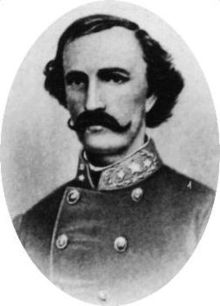Thomas James Churchill
| Thomas James Churchill | |
|---|---|

Churchill during the American Civil War
|
|
| 13th Governor of Arkansas | |
|
In office January 11, 1881 – January 13, 1883 |
|
| Preceded by | William Miller |
| Succeeded by | James Berry |
| Personal details | |
| Born |
March 10, 1824 Louisville, Kentucky |
| Died | May 14, 1905 (aged 81) Little Rock, Arkansas |
| Resting place |
Mount Holly Cemetery Little Rock, Arkansas 34°44′16.5″N 92°16′38.6″W / 34.737917°N 92.277389°W |
| Political party | Democratic |
| Military service | |
| Allegiance |
|
| Service/branch |
United States Volunteers Provisional Army of the Confederate States |
| Years of service | 1846–1847 (USV) 1861–1865 (PACS) |
| Rank |
|
| Unit | 1st Kentucky Cavalry (1846–1847) |
| Commands |
1st Arkansas Mounted Rifles Churchill's Brigade Churchill's Division |
| Battles/wars |
Mexican-American War American Civil War |
Thomas James Churchill (March 10, 1824 – May 14, 1905) was a Confederate major general during the American Civil War and the 13th Governor of Arkansas.
Churchill was born near Louisville, Kentucky. He graduated from St. Mary's College in Bardstown, Kentucky in 1844. He studied law at Transylvania University in Lexington.
Churchill served during the Mexican-American War and rose to the rank of first lieutenant in the 1st Kentucky Mounted Rifles. He was captured by the Mexican Army and remained a prisoner of war until near the end of the conflict. In 1848, he moved to Little Rock, Arkansas, married the daughter of Senator Ambrose Sevier, and became a planter. Appointed by President James Buchanan, he was postmaster of Little Rock from 1857 to 1861.
At the start of the Civil War, Churchill offered his services to the state and was elected colonel of the 1st Arkansas Mounted Rifles. His first combat took place at the Battle of Wilson's Creek near Springfield, Missouri. On March 4, 1862, he was promoted to Brigadier General and soon thereafter took part in Maj. Gen. Kirby Smith's Kentucky Campaign. Churchill played an important role in the victory at Richmond, Kentucky, commanding a division of men from Texas and Arkansas. Leading his division along a ravine that became known as "Churchill's Draw" he delivered a successful and surprising flanking attack. On February 17, 1864, Churchill was cited as one of three officers to receive special recognition in a Thanks of Confederate Congress resolution for his actions at Richmond.
...
Wikipedia
